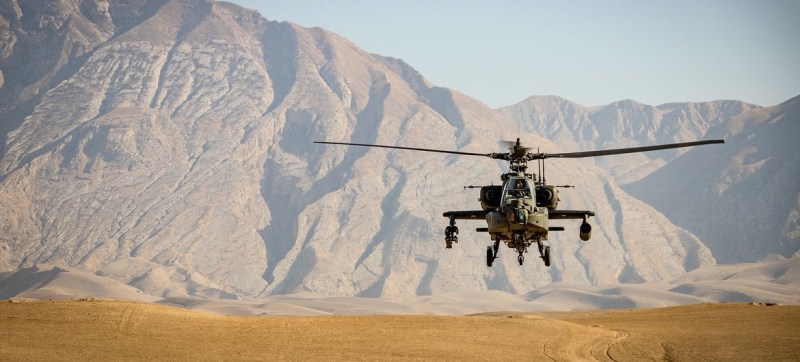- Exporters to import duty-free raw materials: NBR Chairman |
- Gaza aid flotilla activists say second boat hit by suspected drone |
- Shibir-backed candidates win top DUCSU posts with big margin |
- Female dorm Ruqayyah Hall comes up for Shibir this time |
- Bangladesh 2024, Nepal 2025: Youth Movements Force Leaders Out |
Global Military Spending Hits Record $2.7 Trillion

An attack helicopter flies over Afghanistan. (file) Unsplash/Andre Klimke
Global military spending soared to an unprecedented $2.7 trillion in 2024 amid intensifying wars and escalating geopolitical tensions.
“The world is spending far more on waging war than on building peace,” UN Secretary-General António Guterres said while presenting his new report on the dangers posed by the steady rise in military expenditure.
Spending on security increased across all five global regions during 2024, marking the steepest annual rise in at least three decades. By contrast, the UN estimated that extreme poverty could be eradicated with just under $300 billion—barely a fraction of what nations allocated to their military budgets.
“A more secure world begins by investing at least as much in fighting poverty as we do in fighting wars,” said Mr. Guterres.
A choice between aid or arms
The $2.7 trillion spent on arms in 2024 was 750 times the UN’s regular budget for the year. It also amounted to nearly 13 times the development assistance provided by OECD members, highlighting the trade-off between military expansion and sustainable development.
“Redirecting even a fraction of today’s military spending could close vital gaps—putting children in school, strengthening healthcare, expanding clean energy, building resilient infrastructure, and protecting the most vulnerable,” Mr. Guterres stressed.
The UN report estimates that with only a small portion of what was invested in militaries in 2024 and the preceding decade, the world could finance universal education in low and lower middle-income countries, eliminate global child malnutrition, fund climate adaptation in developing states, and move closer to achieving the Sustainable Development Goals (SDGs).
“Rebalancing global priorities is not optional—it is an imperative for humanity’s survival,” said Izumi Nakamitsu, the UN’s disarmament chief.
‘Sustainable development in jeopardy’
With only one of the 17 SDGs on track, Mr. Guterres warned that “our shared promise of sustainable development is in jeopardy.”
While governments expand military budgets, they invest less in poverty reduction, education, health, environmental protection, and infrastructure—hindering progress on almost all SDGs and undermining the spirit of the UN Charter.
“But we know that development is a driver of security, and multilateral cooperation works,” said UNDP deputy chief Haoliang Xu.
“When people’s lives improve, when they gain access to education, healthcare, and economic opportunities, and when they live with dignity and self-determination, societies become more peaceful and the world more stable.”
A new security approach
“Investing in people is investing in the first line of defence against violence in any society,” Mr. Guterres emphasised.
The UN report calls for a human-centred and multidimensional approach that prioritises diplomacy and international cooperation while paving the way for sustainable development.
It warns that poverty, lack of opportunity, and underdevelopment create a vicious cycle that fuels instability, violence, and ever-rising military expenditure.
“The evidence is clear: excessive military spending does not guarantee peace,” Mr. Guterres concluded. “It often undermines it—fuelling arms races, deepening mistrust, and diverting resources away from the very foundations of stability.”

